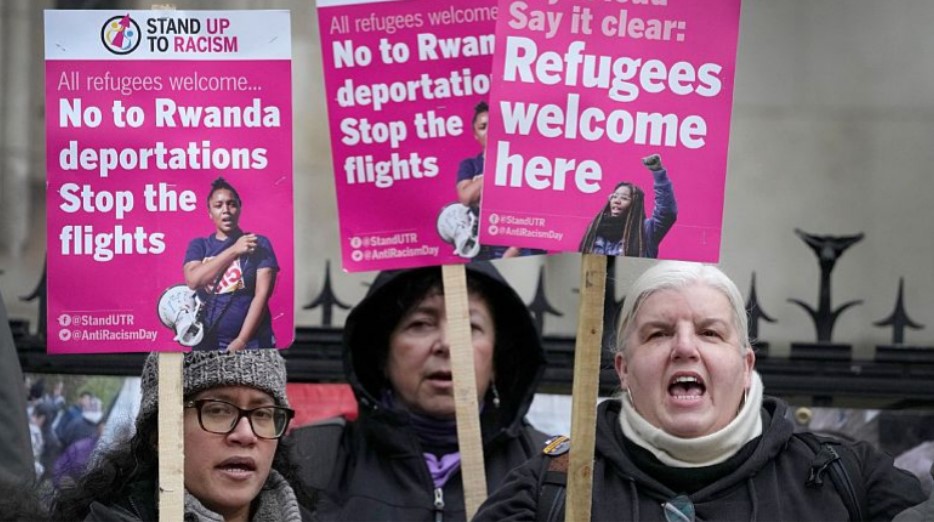
The High Court in London has today ruled the British government’s plan to send asylum seekers to Rwanda is legal.
In April, the UK struck a deal with Kigali, aiming to send tens of thousands of migrants arriving on its shores to Rwanda. However, no deportation has yet taken place because of legal challenges — and this may remain the case should there be further appeals.
Announcing the court’s decision, Judge Clive Lewis said it was lawful for Britain to make arrangements with the Rwanda government to send asylum seekers to the country for their asylum claims to be determined there.
“The (British) government has made arrangements with the government of Rwanda which are intended to ensure that asylum claims of people relocated to Rwanda are properly determined there,” the judge said.
“In those circumstances, the relocation of asylum seekers to Rwanda is consistent with the Refugee Convention and with the statutory and other legal obligations on the government, including the obligation imposed by the Human Rights Act 1998.”about:blank
But the High Court added that the country’s former interior minister had failed to consider properly the individual circumstances of eight individual asylum-seekers who had challenged the policy. Those cases must be reconsidered, he said.
The decision has been welcomed by the government in Kigali. “We welcome this decision and are ready to offer asylum seekers and migrants the opportunity to build a new life in Rwanda,” government spokeswoman Yolande Makolo told AFP, calling it a “positive” step to solve the global migration crisis.
The first planned deportation flight was blocked in June by a last-minute injunction from the European Court of Human Rights (ECHR), and the strategy’s lawfulness was subsequently challenged by a judicial review at London’s High Court.
The government’s victory on Monday does not mean that flights can take off straight away because there may be a further appeal in the British courts. The ECHR injunction imposed during the summer prevents any immediate deportations until the conclusion of legal action in the United Kingdom.
All this comes at a time when illegal crossings of the English Channel have reached record levels, and Prime Minister Rishi Sunak has staked his political credibility on stopping the arrivals in small boats.
Britain’s ruling Conservative Party has made a priority of the Brexit promises of tackling immigration and control of the country’s borders.
Sunak has said he wants to restart flights to Rwanda, despite opposition from politicians across all main parties, as well as the United Nations.
The prime minister is under growing pressure from his own members of parliament and the public, with figures showing around 45,000 people have arrived in small vessels on English shores this year, compared to 28,526 in 2021.
Four migrants, including a teenager, died attempting the crossing last week. In November 2021, 27 migrants perished when their small boat capsized trying to make the journey.
The UK and France have vowed to intensify a drive to stop the dangerous journeys, with only limited success.
Many migrants have travelled from Afghanistan, Iran, or other countries suffering war or repression to travel across Europe. Increasing numbers this year have come from Albania — which the UK insists is a “fundamentally safe country” — prompting calls for a clampdown on criminal people-smuggling gangs.
Lawyers acting for asylum seekers from countries including Syria, Sudan, and Iraq, as well as charities and Border Force staff told the High Court in hearings this year that the government’s Rwanda policy was inhumane and does not comply with human rights conventions.
They said that Rwanda, whose own human rights record is under scrutiny, does not have the capacity to process the claims, and there is a risk some migrants could be returned to countries from which they had fled, citing concern raised by government officials themselves.
Government lawyers argued that the agreement with Rwanda ensured that those who would be deported there would have a “safe and efficient” refugee status determination procedure.
Britain says the Rwanda deportation strategy will help deter migrants from making the perilous trip across the English Channel and will smash the business model of people-smuggling networks.
Supporters of the Rwanda deal say that sending migrants to the country will reduce overcrowding in processing centres and give genuine refugees a home.
Under the agreement with Rwanda, anyone judged to have entered Britain illegally is eligible for deportation, with the exception of unaccompanied children. Deportees granted protection by Kigali would be eligible to live there but would not be permitted to return to Britain.
